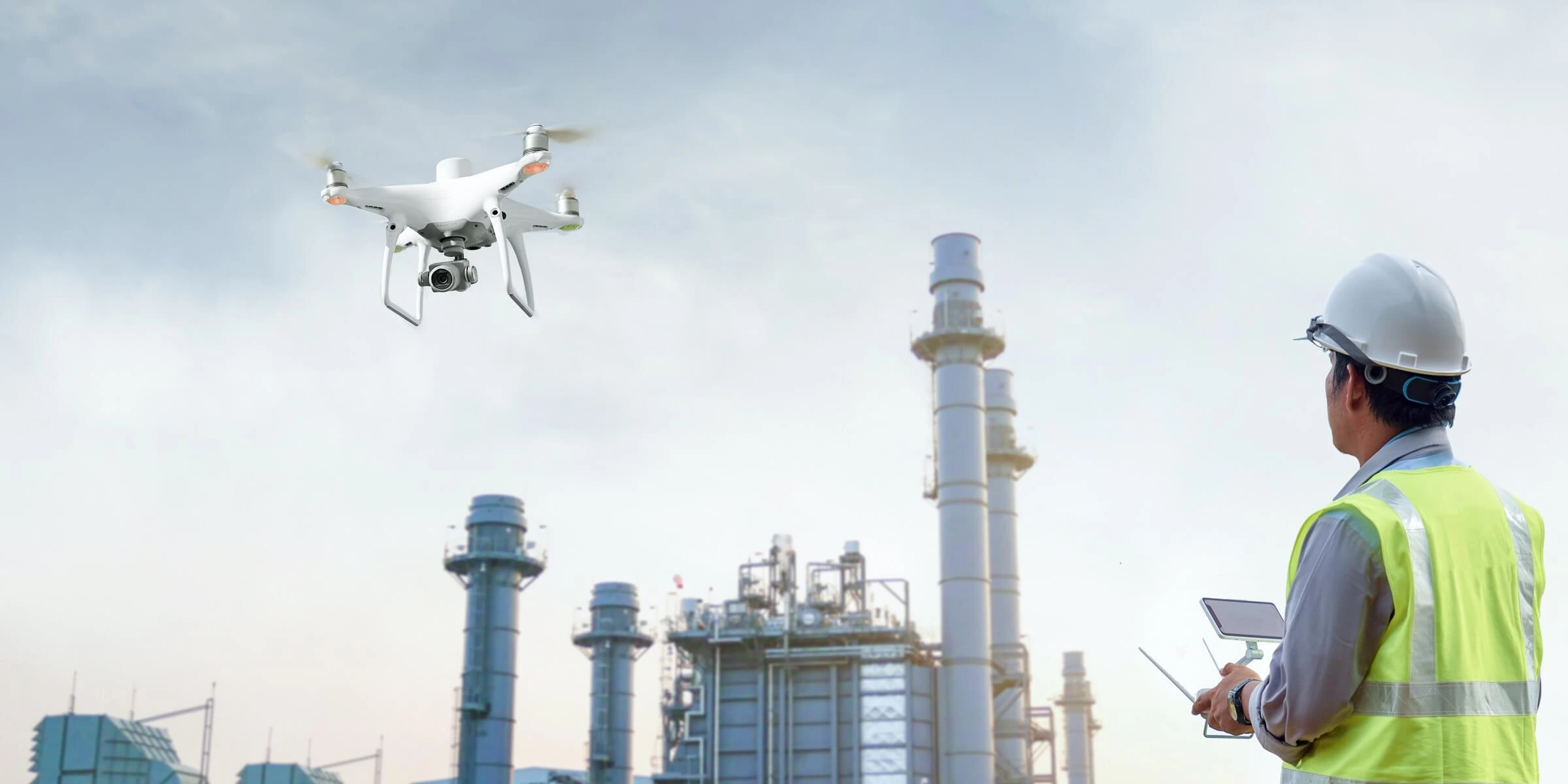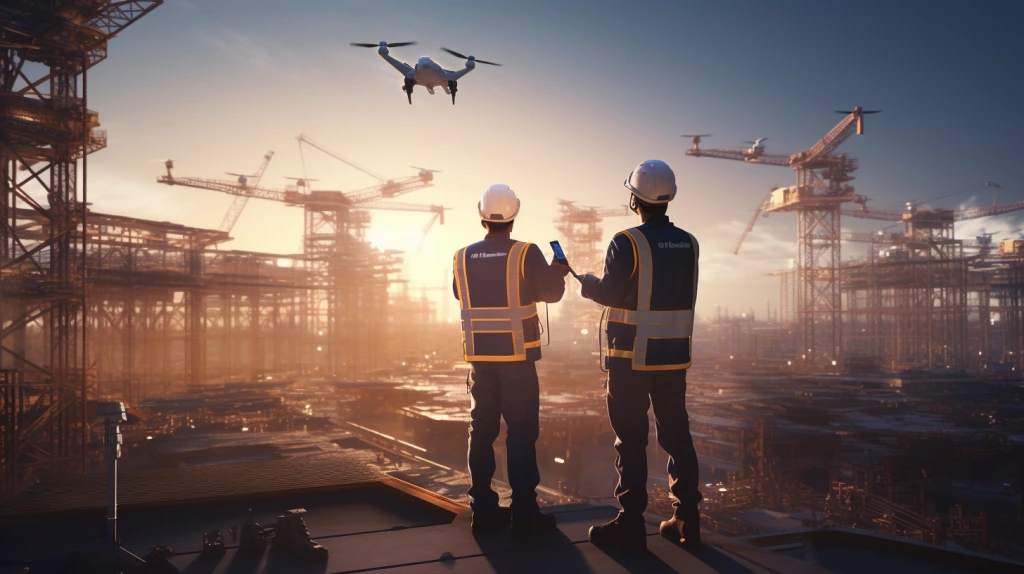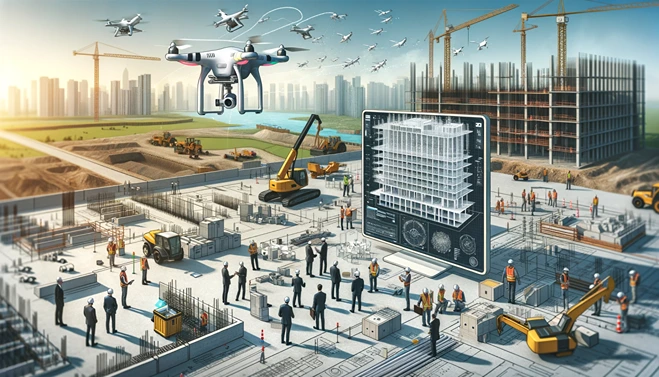Construction Management
Introduction
The UAE has witnessed its fastest pace of construction boom to date, inspired by grand scale projects and the ambition to spearhead a technological driven hub within the region. To manage such a large project efficiently, the quality of tools is very important, and the tool required should be at pace with modern construction. Construction management is now modernized and the transformation it experiences from drone technology offer solutions that help to improve accuracy, safety, and efficiency. In this article, we will look into the importance of Drones in construction management & how traditional methods hurt and what are benefits came along with those drones for UAE builders also some lines on How DJI Products changed the sector completely.

Challenges of traditional construction management (Pain Points)
While they have been effective, the established system in construction management includes a host of limitations that can actively inhibit things like project growth or potential success. Some of the most crucial difficulties are listed herein:
- Data Accuracy: Traditional methods like manual surveys and inspections often present inaccuracies · The consequence of that is erroneous data collection, and it impacts project planning & decision making for all the stakeholders.
- High Labor Costs: Construction projects, especially big ones involve a high level of manpower whether performing site surveys or inspections and monitoring the progress. This will drive up labor costs, putting more pressure on the overall budget of a project that is already tasked with delivery in a high-cost region such as UAE.
- Safety Risks: The Construction sites in general are full of risks. Manual Inspection Performed by workers who are at great risk doing visual inspection for high or difficult to reach areas. Any of these risks can cause an accident, injuries or even loss of human life to bring your project to a screeching enough halt and subsequently cost increases.
- Time-consuming processes: short listing, manual data collection and inspection is a time-intensive activity. If data is not accurate or available in real-time, delays in gathering & analyzing this data and communicating it can lead you down a path of missed deadlines thus lost costs.
- Outdated Technology: Traditional construction management tends to have fragmented communication across the board in terms of teams, as well as data sharing. This causes miscommunication, inefficiency and can delay a project in its implementation.
- Environmental Impact: Traditional methods for inspections like the use of scaffolding, cranes or helicopters are highly impactful to our environment. That is very worrying in a country like the UAE which is focusing on sustainable development.

Advantages of Drones Coalescence in Construction Management
The adoption of drones in construction management workflows overcomes challenges with current methods while offering various advantages that are highly pertinent to the landscape of the UAE’s rapidly evolving industry, such as:
- Improved Data Accuracy: Drones fitted with advanced sensors such as DJI M350 RTK with H30 Series or P1 camera payloads can capture high-resolution images and create accurate construction site-generated models. The importance of such exact data retrieval cannot be reasoned more than well-informed attitude taken minimizes errors.
- Cost Efficiency: Using Drones saves the cost of large manpower and expensive equipment; this gives a notable savings in labor as well as operational costs. As an example, the DJI M3E or M3T can fulfill this task in a cost-effective option for single-pilot operations that yield exceptional data with minimal overhead.
- Decreased Safety Risk: Drones can carry out inspections in areas that could put workers at risk. This greatly improves the safety of operators on job sites and lowers risks of accidents, which saves contractors money.
- Cheaper: Cost-effectively covering distances between adjacent checkpoints is best suitable part handled by UAS mapping in place for understanding and decision-making processes across strategic places, bridges, toll stations etc. These features mean quicker decision making, which keeps projects on track. The DJI Dock 2 combines with the DJI FlightHub 2 software to automate those inspections and other regular monitoring tasks on daily or weekly basis, this is more cost efficient compared to the traditional ways.
- Better Communication and Collaboration: Drones, therefore work well to ensure that data flows more quickly between teams- aiding in better communication and collaboration. This data can be exported directly into your existing construction management systems, providing the ability to view status details by any stakeholder.
- Less environmental impact: Drones provide a greener alternative to construction management. They are energy and resource efficient, resulting in less environmental burden on the Construction.
UAV in Construction Progress Management
In the future of construction, drones will be a game changer for monitoring work progress across UAE. Following are few of the important use cases
- Site Surveying and Mapping: Drones such as the DJI M3E, DJI M30 Series, DJI M350 RTK with P1 payload are used to conduct thorough site surveys that produce precise 2D and 3D maps. This can be really valuable in the case of large construction jobs and with traditional surveying methods which may not always work or are too slow.
- Progress Monitoring: Drones offer an updated visual image of the construction job site and can provide valuable data used for calculating progress. The data can also be compared with the previous reports to find that the project is on track. Powered by DJI FlightHub 2, the combination of the DJI Dock 2 will automate this process for increased efficiency.
- Quality Control: Drones are also employed to check the quality of work and materials used, ensuring that they satisfy the necessary construction standards. For example, sensors like those found in the Zenmuse P1 utilize high-grade cameras that are used to capture photographic images with such detail they can be used for analysis of defects or inconsistencies or H30 Thermal camera payload which can use its thermal sensors to detect cracks in the walls or wire damages.
- Safety Inspections – Doing safety inspection is a need for certain industries and drones are highly suitable to be used in hazardous places. They can identify possible threats to safety early and provide data that may be used in preventing these risks from developing into serious concerns.
- Asset Management: Construction assets (e.g. machinery and materials) can be monitored using drones, to ensure the right equipment is at each site supporting construction project delivery. It will minimize the likelihood of theft, loss and corruption which are not conducive to effective use.
- Environmental Monitoring: Drones can collect data on environmental aspects like air quality and soil erosion, making sure construction operations meet the regulations related to the environment.

How Drone Technology Can Solve Problems
The benefits of drones in construction management are obvious, but there are challenges that must be taken into consideration as well:
- Regulatory Compliance – First and foremost, using drones for construction projects needs to get approved through the regulators. Drone operators in the UAE are required to adhere with regulations by GCAA and obtain permits before conducting drone operations, subject to safety provisions
- Data Management: Considering this data intensive technology, drones tend to generate huge amounts of data which is not an easy task. Products such as DJI FlightHub 2 facilitate the organization, visualization and data sharing so they can be used wisely.
- Technical Expertise: Using drones requires a lot of technical expertise. Training programs and certifications mitigate the risks connected with inexperienced operators.
- Integration with Existing Systems: Merging drone data into the existing construction management tools and software may cause some problems. Nevertheless, DJI says its ecosystem, which includes products such as the Matrice 350 RTK and Zenmuse H30 camera series along with the DJI Dock 2 and DJI FlightHub subscription solutions will easily integrate into various software applications.
Conclusion
With drones, the rules of construction management will change in UAE due to its wide aspects that provide a solution for all problem traditional methods face today. Whether it is for the better accuracy of data, lower safety risks over parts where you cannot physically, or easily reach higher areas in a building with an enormous crane carrying construction material — drones are becoming essential to modern construction projects from all aspects which has led and still leading into: saving costs, reducing project durations. With the ongoing push for infrastructure in UAE, drone technology will play a greater role in which practice and efficiency can be delivered into construction.
As the official dealer of DJI Enterprise drones in UAE, Oman, Saudi Arabia, Nigeria, Kenya, Uganda, Burkina Faso — Aero Smart UAV offers state-of-the-art products including Matrice 350 RTK with Zenmuse H30 Series, Dock 2 with Matrice 3D, Mavic 3E D-RTK 2 Base station and tripod among other to its customers. These products directly complement workflows related to the construction industry overall and UAE companies in particular can leverage them for advantage, thereby allowing an added assurance that they present themselves while staying on par with innovation. Aerosmart also offers various other products like Autel Robotics Autel Alpha, Autel Max 4T, Max 4N, Autel Evo II Pro V3, Autel Evo II Dual 640T V3, Autel Dragonfish series as well as Enterprise and RK Combos.
